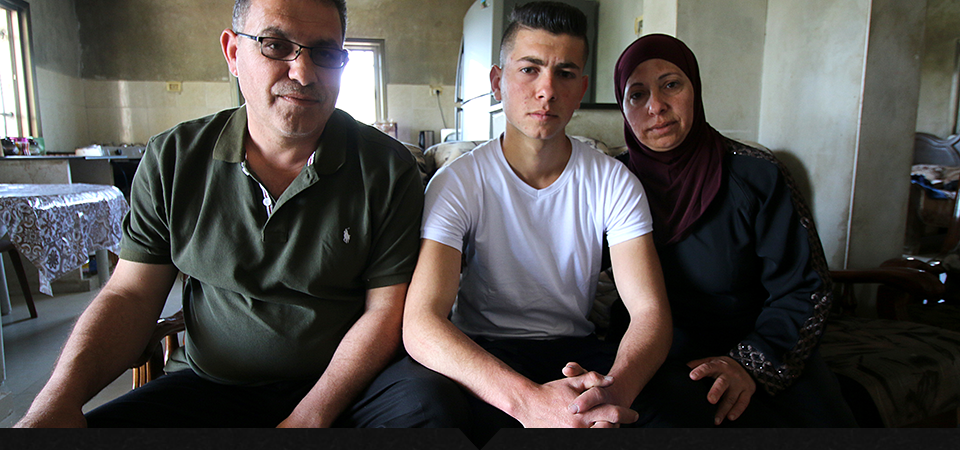
Ramallah, July 9, 2019—It began like most night arrests. Early on the morning of September 20, 2017, around 2 a.m., Israeli soldiers entered Laith K.’s home in Kafr Ein village, outside of Ramallah. Laith, then 17 years old, was bound, blindfolded, and physically assaulted by Israeli forces. He was neither informed of the reason for his arrest nor presented with a warrant.
Over the next eleven hours, Laith was transferred to multiple locations, including a military checkpoint and an Israeli police station in an illegal settlement.

Laith K. sits on the balcony of his house in Kafr Ein. (Photo: DCIP / Ahmad Al-Bazz)
“While inside the jeep, it felt like the trip took hours,” he later told Defense for Children International – Palestine.
Laith arrived at Israel’s Ofer military compound around 1 p.m. During interrogation, he was questioned about throwing stones, a “security offense” under Israeli military law. He denied the allegations. The interrogator printed out a statement in both Arabic and Hebrew and made him sign it.
That afternoon, Laith had his first appearance before a military court judge at Ofer military court. It was there that Laith first learned of the Israeli military authorities’ intention to detain him without any charges against him. At this initial hearing, Laith’s detention was extended for 72 hours to allow Israeli military authorities to prepare and issue an administrative detention order.

A general view of Kafr Ein, near Ramallah, in the occupied West Bank. (Photo: DCIP / Ahmad Al-Bazz)
Not then, nor at any of his subsequent court appearances, was Laith — or his DCIP attorney — ever informed of the reason for his detention.
Six days after he was detained, an Israeli military judge approved a four-month administrative detention order against Laith. The order was renewed in January 2018 for an additional four months, and renewed for a second time in May.
On August 6, 2018, more than 6 weeks prior to the September 17 expiration of Laith’s third administrative detention order, Israeli forces released Laith without explanation. He spent nearly 46 weeks in military detention and was never formally charged with a crime. This prolonged detention forced him to miss his final year of high school.

Since 1967, all Palestinians in the West Bank live under Israeli military law. (Photo: DCIP / Ahmad Al-Bazz)
Unfortunately, experiences like Laith’s have increased in frequency in recent years. Between 2012-2014, Israeli forces briefly suspended its practice of detaining children under administrative detention orders. However, between October 2015 and June 2019, DCIP documented 30 children in administrative detention.
Most recently, Israeli forces detained 16-year-old Suleiman G. from Qalandia refugee camp, near Jerusalem, on January 22, 2019. Israeli military authorities held the boy in administrative detention for approximately four months before releasing him on May 13. Of four Palestinian teenagers who were minors at the time Israeli forces placed them in administrative detention in 2018, one has been released while the other three remain under administrative detention but have since turned 18.

In total, Laith was detained without charge or trial for nearly 46 weeks. (Photo: DCIP / Ahmad Al-Bazz)
Administrative detention is a form of imprisonment without charge or trial. Children held under administrative detention orders are never presented with charges, and their detention is based on secret evidence that is neither disclosed to the detainee nor the detainee’s attorney. Therefore, children held in administrative detention and their attorneys have no legal means of challenging the detention and the alleged basis for it. This amounts to a denial of a fundamental due process right.
Military court judges, who are active duty or reserve officers in the Israeli army, have the authority to approve administrative detention orders lasting up to six months. There is no limit to the number of times an administrative detention order can be renewed. As a result, children held in administrative detention face the added uncertainty of indefinite imprisonment, in addition to the ordinary struggles child prisoners face.

DCIP attorney Farah Bayadsi says that administrative detention presents unique challenges for attorneys given that they cannot review or even know the contents of the alleged evidence against the child. (Photo: DCIP / Ahmad Al-Bazz)
“You can’t know when you will be released, what will happen to you, or anything else,” Laith said in an interview with DCIP after his release.
United Nations human rights bodies, including the Committee on the Rights of the Child and the Committee Against Torture have expressed concern over Israel’s use of administrative detention and Israel’s prosecution of children in military tribunals. The U.N. Working Group on Arbitrary Detention, a body of independent experts that investigates cases of arbitrary detention and imprisonment, has emphasized in numerous opinions that Israel’s military tribunal system does not rise to the level of independence and impartiality required by international law.
In March 2018, after Laith had already been imprisoned for more than six months without charge and with no end to his detention in sight, DCIP filed a petition on Laith’s behalf with the U.N. Working Group on Arbitrary Detention. The Working Group concluded Israeli military authorities’ detention of Laith amounted to an arbitrary detention. The Working Group found the detention arbitrary based on four of the five categories that the Working Group considers. The conditions need only be established in one of the five categories for the Working Group to determine a detention to be arbitrary.
In its favorable opinion released in November 2018, the Working Group described Laith’s interrogation as “wholly unacceptable according to international standards,” expressed serious concern about Israeli forces’ treatment of Laith, and referred his case to the Special Rapporteur on torture and other cruel, inhuman or degrading treatment or punishment.

Laith shows a Red Cross document with his arrest details. (Photo: DCIP / Ahmad Al-Bazz)
The Working Group also noted that many of the administrative detention cases follow “familiar pattern[s]” of systematic human rights violations, which could amount to crimes against humanity.
DCIP evidence shows that Israel’s army detains an average of 500-700 Palestinian children annually, systematically ill-treating and abusing the detained children, while the military courts lack basic safeguards for a fair trial.




